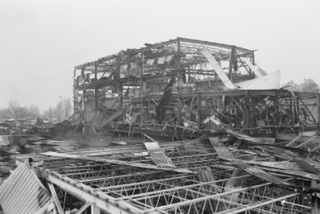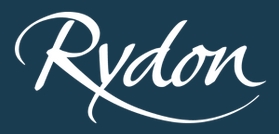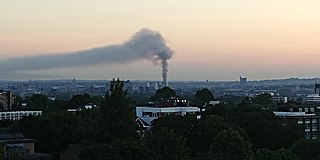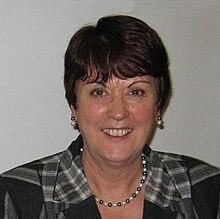
The Health and Safety Executive (HSE) is a British public body responsible for the encouragement, regulation and enforcement of workplace health, safety and welfare. It has additionally adopted a research role into occupational risks in the United Kingdom. It is a non-departmental public body with its headquarters in Bootle, England. In Northern Ireland, these duties lie with the Health and Safety Executive for Northern Ireland. The HSE was created by the Health and Safety at Work etc. Act 1974, and has since absorbed earlier regulatory bodies such as the Factory Inspectorate and the Railway Inspectorate though the Railway Inspectorate was transferred to the Office of Rail and Road in April 2006. The HSE is sponsored by the Department for Work and Pensions. As part of its work, HSE investigates industrial accidents, small and large, including major incidents such as the explosion and fire at Buncefield in 2005. Though it formerly reported to the Health and Safety Commission, on 1 April 2008, the two bodies merged.

The Building Act 1984 is an Act of the Parliament of the United Kingdom consolidating previous legislation concerning the construction process, and the design and specifications for buildings and their component parts, and related matters, in England and Wales. The Welsh Government may make its own building regulations for Wales under this Act.

Building regulations in the United Kingdom are statutory instruments or statutory regulations that seek to ensure that the policies set out in the relevant legislation are carried out. Building regulations approval is required for most building work in the UK.

The Building Research Establishment (BRE) is a centre of building science in the United Kingdom, owned by charitable organisation the BRE Trust. It is a former UK government national laboratory that was privatised in 1997. BRE provides research, advice, training, testing, certification and standards for both public and private sector organisations in the UK and abroad. It has its headquarters in Garston, Hertfordshire, England, with regional sites in Glasgow, Swansea, the US, India, the Middle East and China.

The West Pharmaceutical Plant explosion was an industrial disaster that occurred on January 29, 2003, at the West Pharmaceutical Plant in Kinston, North Carolina, United States. Six people were killed and thirty-six people were injured when a large explosion ripped through the facility. Two firefighters were injured in the subsequent blaze. The disaster occurred twelve years and 170 miles (270 km) from the 1991 Hamlet chicken processing plant fire, North Carolina's second-worst industrial disaster.

Sir Kenneth John Knight, is a retired British firefighter and public servant. From 2003 to 2007, he was the Commissioner of the London Fire Brigade and Commissioner for the London Fire and Emergency Planning Authority. From 2007 to 2013, he was the Chief Fire and Rescue Adviser for England.

A sandwich panel is any structure made of three layers: a low-density core, and a thin skin-layer bonded to each side. Sandwich panels are used in applications where a combination of high structural rigidity and low weight is required.

Cladding is the application of one material over another to provide a skin or layer. In construction, cladding is used to provide a degree of thermal insulation and weather resistance, and to improve the appearance of buildings. Cladding can be made of any of a wide range of materials including wood, metal, brick, vinyl, and composite materials that can include aluminium, wood, blends of cement and recycled polystyrene, wheat/rice straw fibres. Rainscreen cladding is a form of weather cladding designed to protect against the elements, but also offers thermal insulation. The cladding does not itself need to be waterproof, merely a control element: it may serve only to direct water or wind safely away in order to control run-off and prevent its infiltration into the building structure. Cladding may also be a control element for noise, either entering or escaping. Cladding can become a fire risk by design or material.

Kingspan Group plc is a building materials company based in Ireland, trading in over 80 countries with more than 210 factories employing over 22,000 people. The company operates with six divisions; Insulated Panels, Insulation, Light & Air, Water & Energy, and, Data & Flooring, Roof & Waterproofing.

Exova Group plc was a laboratory-based testing company, operating primarily within the testing segment of the Testing Inspection and Certification (“TIC”) sector. It was listed on the London Stock Exchange until it was acquired by Element Materials Technology in June 2017.

The Department of Chemical Engineering, Imperial College London is the centre of teaching and research in chemical and process engineering at Imperial College London, occupying the Aeronautics and Chemical Engineering Extension (ACEX), Bone and Roderic Hill buildings, on the South Kensington campus. Formally inaugurated in 1912, the department has over 40 faculty members, 100 postdoctoral researchers, 200 PhD researchers, 80 taught postgraduates, and 500 undergraduates. The department ranks 7th on QS's 2018 world rankings.

On 14 June 2017, a high-rise fire broke out in the 24-storey Grenfell Tower block of flats in North Kensington, West London, England, at 00:54 BST and burned for 60 hours. Seventy people died at the scene and two people died later in hospital, with more than 70 injured and 223 escaping. It was the deadliest structural fire in the United Kingdom since the 1988 Piper Alpha oil-platform disaster and the worst UK residential fire since the Blitz of World War II.

Rydon is a British facilities management and property maintenance company which was founded in 1978. Its head office is in Dartford, Kent, and it has two maintenance offices in London. It had a turnover of around £51.9 million and employed an average of 423 people in the year to September 2022.

The Grenfell Tower Inquiry is a British public inquiry into the Grenfell Tower fire, which killed 72 people and destroyed Grenfell Tower on 14 June 2017. It was ordered by Prime Minister Theresa May on the day following the fire.
The Barking fire was a structure fire that occurred on 9 June 2019 at a newly built six storey block of flats named Samuel Garside House, located in De Pass Gardens, Barking, London, the United Kingdom.
Arconic Corporation is an American industrial company specializing in lightweight metals engineering and manufacturing. Its products are used worldwide in aerospace, automotive, packaging, oil and gas, building and construction, defense, commercial transportation, consumer electronics, and industrial applications.

The United Kingdom cladding crisis, also known as the cladding scandal, is an ongoing social crisis that followed the Grenfell Tower fire of 14 June 2017 and the Bolton Cube fire of 15 November 2019. The fires revealed that large numbers of buildings had been clad in dangerously combustible materials, comprising a combination of flammable cladding and/or flammable insulation.
The Grenfell Tower Inquiry is a British public inquiry into the Grenfell Tower fire, which killed 72 people and destroyed Grenfell Tower, a residential building in the Royal Borough of Kensington and Chelsea, London, on 14 June 2017. It was ordered by Prime Minister Theresa May on the day following the fire.
The Grenfell Tower Inquiry is a British public inquiry into the Grenfell Tower fire, which killed 72 people and destroyed Grenfell Tower, residential building in the Royal Borough of Kensington and Chelsea, London, on 14 June 2017. It was ordered by Prime Minister Theresa May on the day following the fire.
The Freshwater Road fire was a fire that broke out in the Spectrum Building, a block of flats on Freshwater Road, Dagenham on 26 August 2024. Four people were injured and treated at the scene with a further two being taken to hospital. Comparisons were immediately drawn to the 2017 Grenfell Tower fire by several news outlets.














